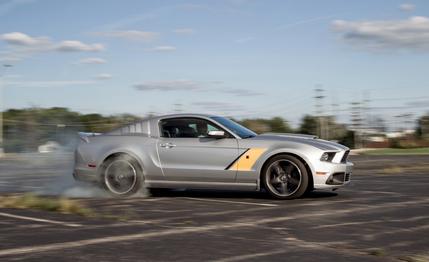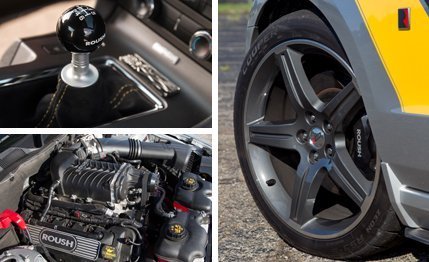 Instrumented Test
Instrumented Test
It’s hard to do anything but love the basic goodness of the Ford Mustang. Its brutally simple recipe ensures not only lots of old-fashioned fun behind the wheel, but also an enormous aftermarket that can, for a price, one-up the factory’s effort with greater style and performance. But with today’s stock Mustangs being so well sorted, adding to the formula doesn’t necessarily improve the outcome.
Roush Performance in Plymouth Township, Michigan, founded by racing icon Jack Roush, currently of NASCAR’s Roush Fenway Racing, has been tuning fast Fords since 1995. Roush has the engineering talent to develop a seemingly formidable street package, such as promised by this $65,980 Stage 3 Mustang based on the 10Best-winning GT model.
Here is the most extreme turnkey pony car Roush offers through select Ford dealers, complete with a three-year/36,000-mile powertrain warranty. It includes the cosmetic and suspension mods of Roush’s lesser Stage 1 ($4500) and Stage 2 ($7950) kits, along with more power under the hood. The centerpiece of the $17,000 Stage 3 upgrade is an Eaton TVS supercharger that huffs eight psi of boost into the otherwise stock 5.0-liter V-8. The company says that’s enough to increase horsepower from 420 to a tire-shredding 575, with the bulk of the gain found near the engine’s 6750-rpm redline. Despite claimed torque also rising from 390 pound-feet to 505, actual forward thrust feels surprisingly similar to our long-term 2013 Mustang GT’s with a six-speed manual, Track package, and 3.73:1 axle ratio.
 About the only thing not Roush-branded here is the rubber. And you better like the name because youll pay big money for it.
About the only thing not Roush-branded here is the rubber. And you better like the name because youll pay big money for it.
The test track confirmed our suspicions, as the 126-pound-heavier Roush could only tie the normal car’s 4.5-second sprint to 60 mph. It did beat, by a tenth and 3 mph, the stocker in the quarter-mile, running a 12.9 at 114 mph. Both figures slightly trail our best from the dearly departed 444-hp Boss 302 and are a full second behind the 662-hp Shelby GT500’s. Handling and braking data, as well as overall feel, are also similar to the GT’s, despite the Stage 3’s lower and firmer suspension system (new shocks and springs, a stiffer front anti-roll bar, and a rear axle upper-control link); a $2350 performance brake option; and $1115 20-inch wheels shod with 275/35R-20 Cooper Zeon RS3-S rubber. When confronted with our less-than-stellar results, Roush confirmed that the blown 5.0’s power levels were accurate, despite our lingering reservations.
So what else do you get with the Stage 3 and our car’s additional $10,890 in Roush options? For starters, you get 67 badges, stickers, and ornaments with the word “Roush” or the company’s signature “R” on them. You also get aggressive body extensions, a Boss 302–style X-brace where the rear seats used to be ($1975), and a barrel-chested exhaust system ($525) that rattles eardrums like machine-gun fire in a drainage pipe. Roush does not do stealth.
Also included in our test car was an additional $3415 in special upholstery and Roush-themed interior upgrades, which curiously excluded one of the GT’s best features: the optional $1595 Recaro front seats. Overall comfort from the less-supportive chairs was still good and was made better by a well-controlled ride, light clutch effort, and a slick manual shifter.
The Roush is more adolescent and special than the GT without being punishing, and the build quality and warranty coverage are genuine assets. To say the Roush reminds us of the Boss 302 is the greatest compliment we can give it, even if the latter feels more refined and hums a sweeter melody through its factory side pipes.
If you like elements of the Roush treatment but don’t see the value in the full Monty depicted here, most of the Stage 3’s components are available separately for both coupe and convertible models with manual or automatic gearboxes, warranty included. Roush will even sell you additional engine packages good for up to 675 horsepower. But if you’re looking for a supercharged pony car with a famous racer’s name on it, you might first consider the $55,595 Shelby and the full backing of Ford’s engineers.